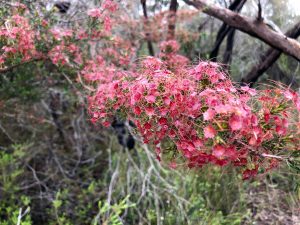I love gardens, but I am not your garden-variety ecumenist. That is to say, I am not extremely fond of any institutional forms of conversation between Christians of different traditions. In fact, I am not fond of any forms of institutional Christianity either. Rather, day by day I joyfully discover the Holy Spirit’s gift of Christian diversity, which amounts, at least to my eyes, to a ‘heavenly rose garden’—to paraphrase the original title of a sixth-century book, The Spiritual Meadow, by John Moschus. And, to continue with the metaphor, I realise the following:
the meadows in spring present a particularly delightful prospect. They display to the beholders a rich diversity of flowers which arrests them with its charm, for it brings delight to their eyes and perfume to their nostrils. One part of this meadow blushes with roses; in another place lilies predominate, drawing one’s attention to themselves and away from the roses. In another part the colour of violets blazes out, resembling the imperial purple. In short, the diversity and variety of innumerable flowers affords enjoyment both to nostril and to eye on every side. (The Spiritual Meadow, prologue, trans. John Wortley, 1992; slightly altered)
This is how I perceive the landscape of Christian diversity. I don’t see a hell of doom and gloom, of orthodoxy and heterodoxy. Suspicion, condescension, and resentment—which still poison the chalice of Christian love—are not what I gather from all around me. What I see are flowers who do their best to praise the Creator by being what they should. I see what Nikos Kazantzakis rendered in what he called a Franciscan haiku, ‘I said to the almond tree, “Sister, speak to me of God”. And the almond tree blossomed’ (Report to Greco). What I see are flowers in bloom, ‘trees planted by streams of water, which yield their fruit in its season, and their leaves do not wither’ (Psalm 1:3).
That said, I realise that, while we all do what we must, we still do it the wrong way. We walk our separate ways as though we’re worlds apart. We seem to have forgotten that ‘no man is an island’, to paraphrase John Donne (XVII Meditation in Devotions upon Emergent Occasions). No blade of grass the meadow, no flower the garden, no tree the orchard. The paradise upsurges from the chaos of conflict and adversity only when all these blades of grass, all these wonderfully scented, colourful flowers, and all these fruitful trees come together in one place, under the Spirit’s breeze (Acts 2:1-4). When the islands connect, exchanging good news. This is the truth I discovered in the last fifteen years or so, working with Christians of all colours and scents within the Sydney College of Divinity, as well as in various ecumenical bodies, including the NSW Ecumenical Council’s Theological Reflection Commission. This is the truth I discovered in the place where I currently work, St Cyril’s, which belongs to a different church tradition from my own.
Trees and flowers. Author’s photo. Ku-ring-gai Chase National Park, 27 October 2020
Patches of the garden in the making gladden the eye of the beholder, for which I am grateful. I never expected, however, to experience the paradise of Christian fellowship and friendship as an immediate reality. But I did, and I do. Let me explain.
More than three years ago, providentially, I met the Revd Dr Lex Akers, who, together with his wife and their congregation of the Pittwater Wesleyan Methodist Church (Mona Vale NSW), found room in their hearts for the little Orthodox mission church I currently guide. Not having any funds to pay the rent, it was very difficult, impossible rather, to find a place we could gather. Those were critical times for our church. No other doors—not even of the Orthodox family—opened to us. Lex, his wife, and their church did open their door, graciously so. I, my wife, and those who pray with us cannot sufficiently express our gratitude for this act of Christian kindness, whose beneficiaries we still are. The story doesn’t end there, though. Attuned to the divine providence that mediated our encounter is a common friend who belongs with yet another church tradition, the Revd Associate Professor Glen O’Brien, to whom I am also grateful. This, I believe, is ecumenism at its best, when Christians help other Christians, regardless of the colour and the scent of the flowers. Such is the work that the Lord wishes us to perform in the garden. There is hope!
Truly the Lord is generous! He keeps pouring grace upon grace in the lives of those who seek him. My encounter with Lex proved to be the beginning of a genuine friendship. Grace upon grace. It has been many years, indeed, since I had a true friend, someone who would be there not expecting any gains from me. The last time it happened was long time ago, in a galaxy far, far away. After my relocation to Sydney, I almost lost hope in this regard, but Lex—a man of another Christian tradition—proved me wrong. Our frequent get-togethers amount to intense Christian experiences. I see our meetings as iterations of the Lord’s Supper, as paradisal events. We talk about our churches, our spiritual traditions, our approaches to prayer and to the scriptural wisdom. We talk about things in heaven and on earth. Our friendship is deepened by our thirst for holiness, as well as by numerous common interests. We are both amazed by the beauty of God’s creation. Above all, we both are disposed to learn from one another, and from each other’s church traditions. We discovered that there’s more we hold in common than what—to many eyes—might seem strong reasons to keep walking apart. And thus we walk together, praying for the day when all the blades of grass, and the variously scented flowers, and the different kinds of fruitful trees will come together in one place, in paradise. Our friendship and cooperation prove that it can be done, no matter how much apart our worlds might be.
Here’s my ecumenical journey so far. I am grateful for every bit of it.
Acknowledgment. Originally published in A Celebration of Ut unum sint: The 25th Anniversary, ed. Doru Costache and Diane Speed (Sydney: NSW Ecumenical Council’s Theological Reflection Commission, 2020) 86-90.
30 November 2020 © AIOCS (for this version)


